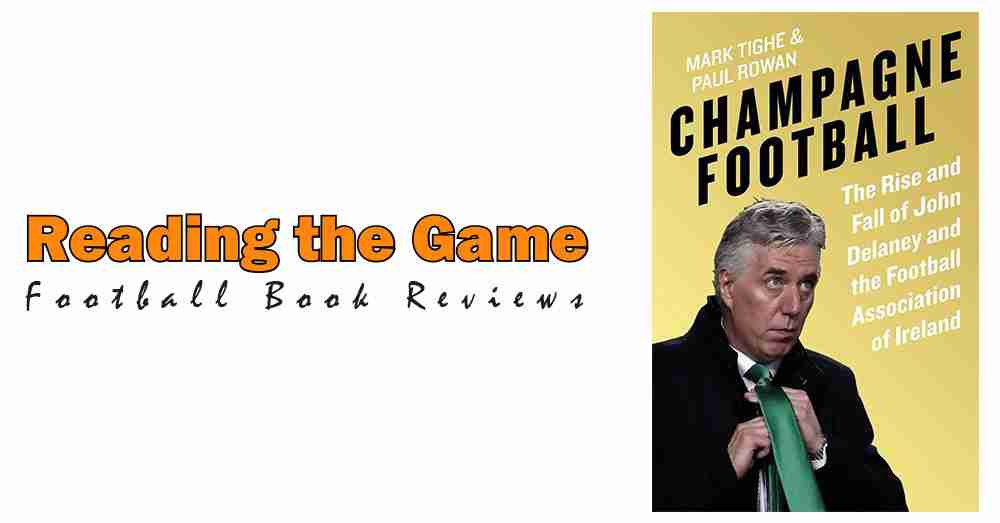I’ve always been fascinated by books covering one or both of the politics of football or the business side of the game. Maybe it’s because I’ve volunteered for non-League clubs since I was 10, or maybe it’s because I worked for a County FA for five years.
Whatever the reason, I suppose that it was inevitable that, given that I’m reading more than I have in years, I’d be drawn to Champagne Football by Mark Tighe and Paul Rowan. This book tells the story of how the FA of Ireland was run by John Delaney for 15 years and how, by the end of his tenure, the organisation was essentially bankrupt.
It’s here we begin the latest batch of reviews in the series I call ‘Reading the Game’; you can find the others by clicking here.
Champagne Football is a remarkable story, made all the more vivid by the fact the authors – both journalists with the Irish Sunday Times – interviewed more than 120 people at all levels of the Irish game. Tighe and Rowan haven’t just rehashed what has already been reported about Delaney’s profligate tenure at the top of Irish football; they have discovered a huge amount of new detail, some of it jaw-dropping.
And yet, if you’ve worked in football, some of it is familiar, possibly depressingly so. John Delaney’s father had been the FAI’s Honorary Treasurer in an era when the body was run more or less entirely by volunteers, elected by their colleagues in clubs and regional Leagues. Joe Delaney had been forced out of his role after an accounting issue arose from the sale of tickets and the authors make a case that Delaney junior’s initial determination to rise through the ranks of Irish football was driven by a sense of injustice. Having been elected to the FAI Council, John Delaney proves himself sufficiently politically astute to claim the Treasurer’s role once held by his Dad and, from there, build a power base which enables him to become the Association’s Chief Executive.
Tighe and Rowan then tell the tale of Delaney’s 15 years at the top of Irish football. And what a tale it is; of wads of banknotes passed over pub bars before Ireland’s away matches, lavish birthday parties and late-night court cases. We learn how, during Delaney’s tenure, the FAI had at least one Honorary Treasurer with virtually no grasp of the financial reports they were supposed to sign off. We discover that the FAI was constantly borrowing from its future income from UEFA, even while the European governing body was holding the FAI up as a model of good governance; John Delaney got himself elected to their Executive Committee.
The tale is told exceptionally well; this book is a genuinely gripping page-turner. It is the story of an astute politician who built a strong power base within the grassroots of Irish football then, through a combination of charm, strongarm tactics and money, consolidated that base to become virtually untouchable. Such was his grip on the organisation that it was paying €3,000 per month for the rent on Delaney’s home at a time when considerably less well-off FAI staff were taking pay cuts in order to protect their jobs. Of course, the FAI was only acting out of a duty of care to their CEO; how could he possibly be expected to pay his own rent on his meagre stipend of €360,000 per year?
Tighe and Rowan’s extensive research and meticulous reporting showed that, by the time Delaney had been forced out of his palatial offices, with only a €462,000 severance package to help keep the wolf from the door, he had left the FAI with net liabilities of €55,000,000. Only a bailout from the Irish Government, UEFA and local banks has prevented its collapse.
The skill of Tighe and Rowan is that they record all of this in such a way that the reader can clearly see how Delaney managed to keep the circus running for as long as he did. I genuinely couldn’t put Champagne Football down; each page took me deeper into the story. I could practically taste the pints being sunk by fans availing themselves of a tab picked up by Delaney, feel the tension when pre-match banquets were turned into grandstanding occasions for score-settling and sense the sorrow when those outflanked by the CEO told their stories.
This book will anger and astonish football fans, especially Irish football fans. And so it should. But it is never, ever dull. It is a remarkable tale of what can happen when ego and power are allowed to run unchecked and should be essential reading for anyone passionate about the game.
Champagne Football is published by Penguin Ireland and widely available, but I use Stanchion for as much of my football book-buying as possible. They’re an indenpendent bookshop with great customer service.
